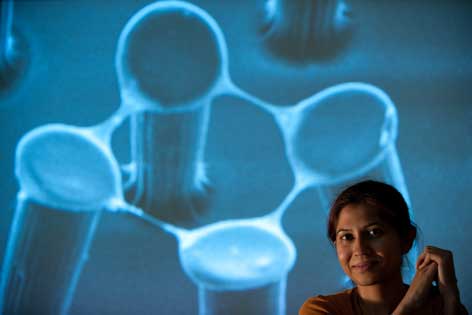Fabricating the Future
RapidTech trains tomorrow’s workforce in advanced manufacturing technologies like 3-D printing
 Ed Tackett, director of RapidTech, whirls through the fourth floor of UC Irvine’s Engineering Hall, showing off tiny toy figurines, a bright-red leg bone, a waxen skull and more.
Ed Tackett, director of RapidTech, whirls through the fourth floor of UC Irvine’s Engineering Hall, showing off tiny toy figurines, a bright-red leg bone, a waxen skull and more.
“We’re just finishing the housing for a ‘non-squish’ breast cancer detector,” he says, looking at freshly painted soft-pink components. Student intern Garritt Ong, 20, of Saddleback College looks on, hefting a block of resin to begin a project of his own. “I love it; I’m learning everything about everything,” he says enthusiastically.
All of the items on display and hundreds more have been designed on computers and produced via three-dimensional printing at the National Center for Rapid Technologies, or RapidTech, the only nonprofit in the U.S. dedicated to hands-on training of community college and university students in the next wave of advanced manufacturing.
Forget the Industrial Revolution and tool-and-die factory assembly lines. While custom 3-D printers are gaining popularity in home handyman projects, the printers here are industrial-strength, and so is the mission.
It’s a campus version of the supply chain of the future, academics and other experts say, and key to bringing full-fledged manufacturing back to this nation. President Obama is seeking $1 billion in next year’s federal budget to make the U.S. a world leader in advanced manufacturing.
The National Institute of Standards & Technology is hosting multi-agency workshops around the country to gather public input. The next will be Thursday, Sept. 27, at the Arnold & Mabel Beckman Center of the National Academies of Sciences & Engineering, on the UCI campus.
This is fitting, as UCI is already leading the way in biomedical and additive manufacturing, and in educating a future workforce. While the U.S. has pioneered these additive manufacturing techniques, European and Asian researchers and companies are catching on fast.
“China is not in a race to the bottom with us; they are in a race to the top. They have a very large number of high-tech factories, and they are incorporating the very latest advanced manufacturing technologies. So we need to remain one step ahead,” says Gregory Washington, dean of The Henry Samueli School of Engineering.
